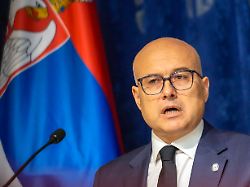Election is just a formality
Defense Minister Vucevic should lead Serbia’s government
March 30, 2024, 9:38 p.m
Listen to article
This audio version was artificially generated. More info | Send feedback
Serbia’s political future is unclear. The country is wavering between joining the EU and proximity to Russia and China. There is also considerable criticism of the current Prime Minister’s authoritarian leadership style. And he’s trying to cement his power. So the designated head of government should continue his policy.
Serbian Defense Minister Milos Vucevic is expected to become the new prime minister. More than three months after the parliamentary election won by his Progressive Party (SNS), President Aleksandar Vucic has tasked his close party friend Vucevic with forming a government. Vucic announced this on Instagram. Vucevic is set to replace the current head of government, Ana Brnabic.
Observers expect a smooth election for Vucevic because his party has an absolute majority in parliament, a total of 129 of the 250 seats. The 49-year-old lawyer has been Deputy Prime Minister and Defense Minister since 2022. He was elected mayor of Novi Sad in 2012 and re-elected in the 2016 and 2020 local elections.
In May 2023, he was also elected president of the Progress Party (SNS), replacing Vucic at the top of the party. However, no one in Serbia doubts that Vucic remains the informal and sole center of power in the country – although formally as head of state he has more protocol-related powers. He has been determining the country’s fortunes in changing roles since 2012.
Numerous allegations against Vucic
Critics accuse Vucic of an authoritarian style of government. According to them, he abuses the government apparatus, police and secret services in order to economically ruin political competitors and publicly defame them.
In the early parliamentary election on December 17, 2023, the SNS received around 47 percent of the votes. The liberal opposition alliance “Serbia Against Violence” became the second strongest force with around 23 percent of the vote. The election was accompanied by allegations of fraud from the opposition. The OSCE also complained that the circumstances of the vote were not fair. The protests reached their climax on December 24th when demonstrators in Belgrade attempted to storm the city hall.
Serbia has been negotiating to join the EU since 2014, but the talks have been slow. At the same time, Vucic maintains good relations with Russia and China.
